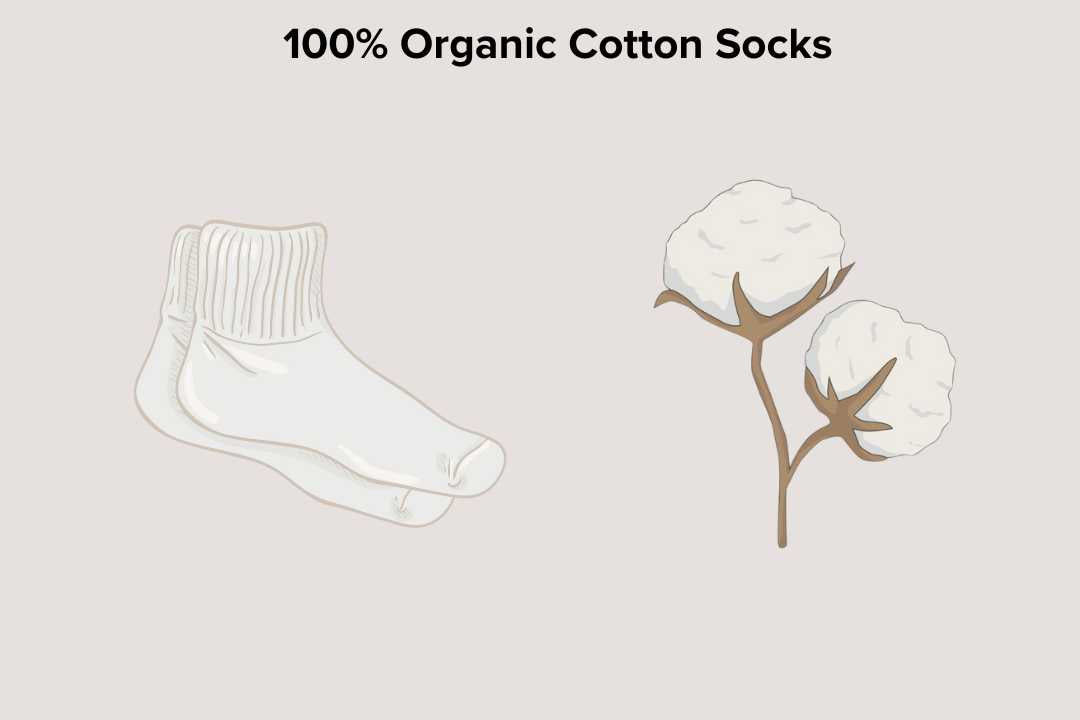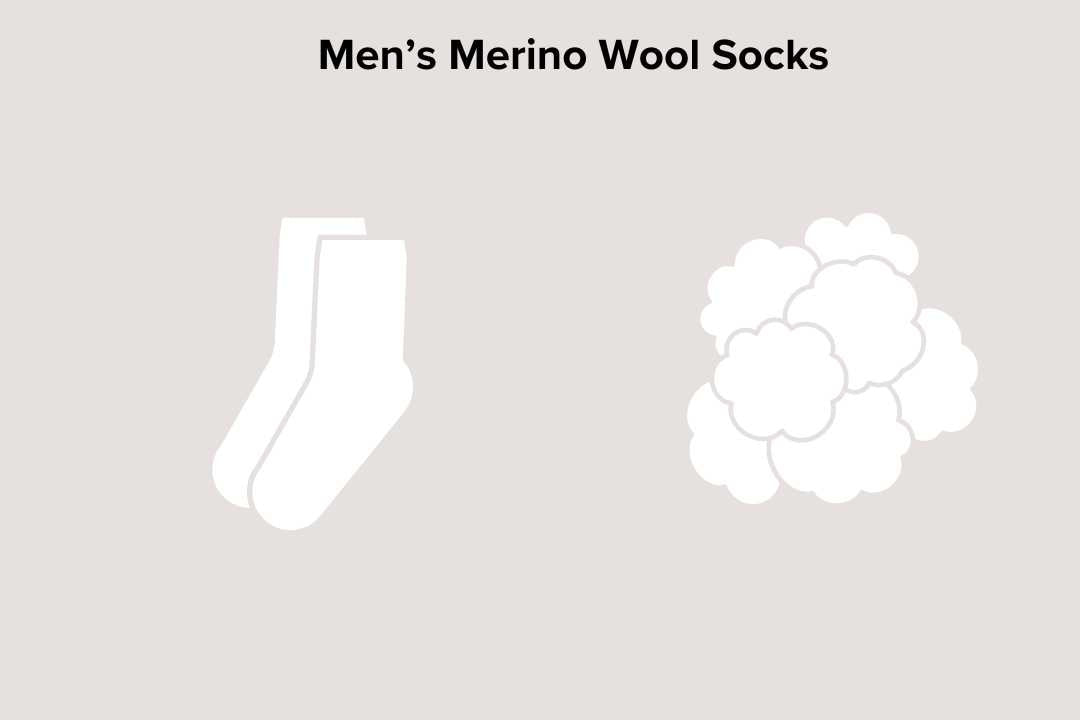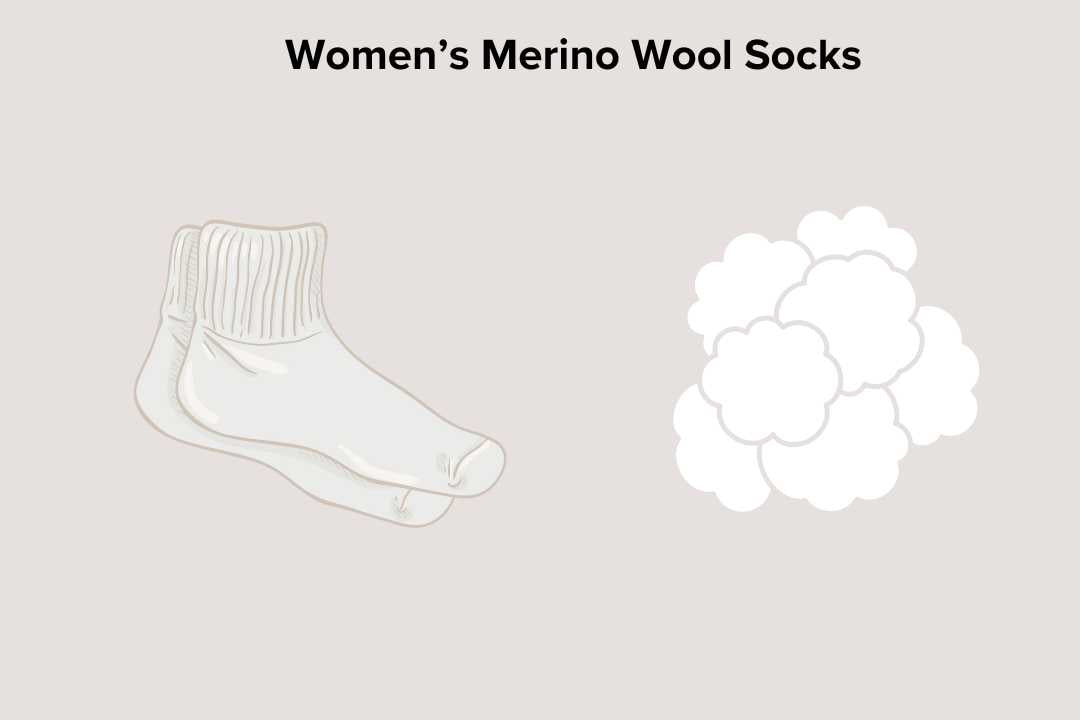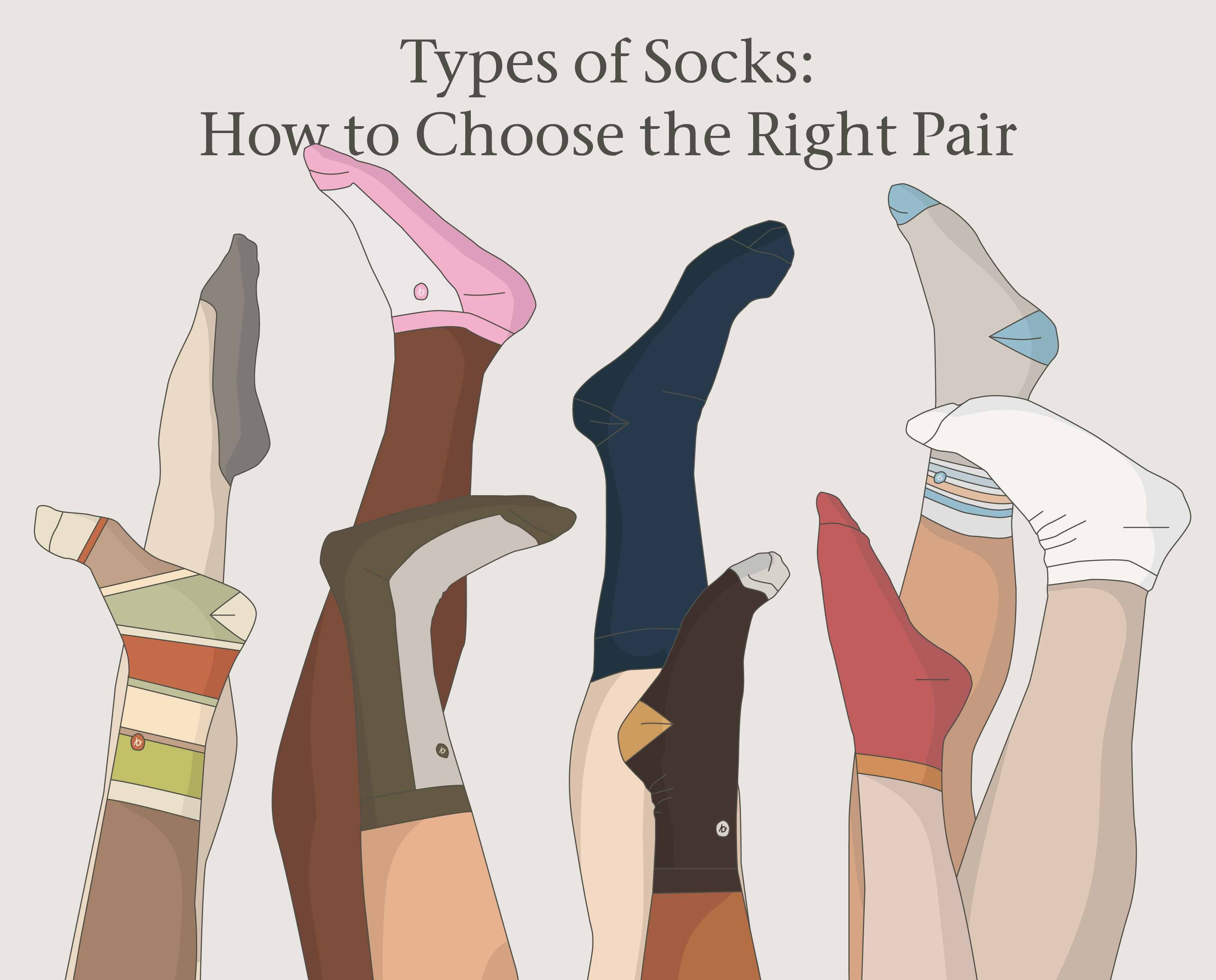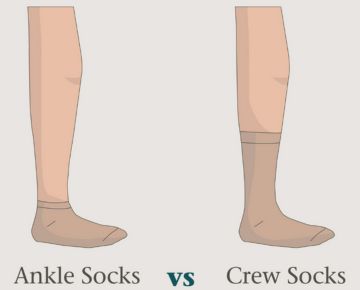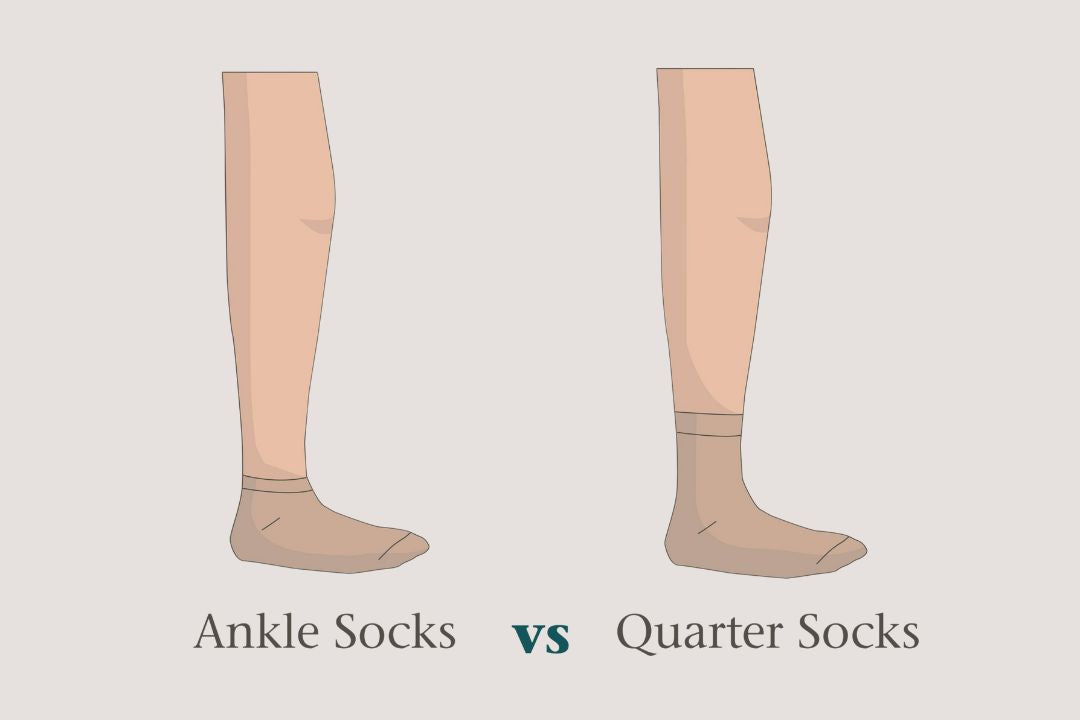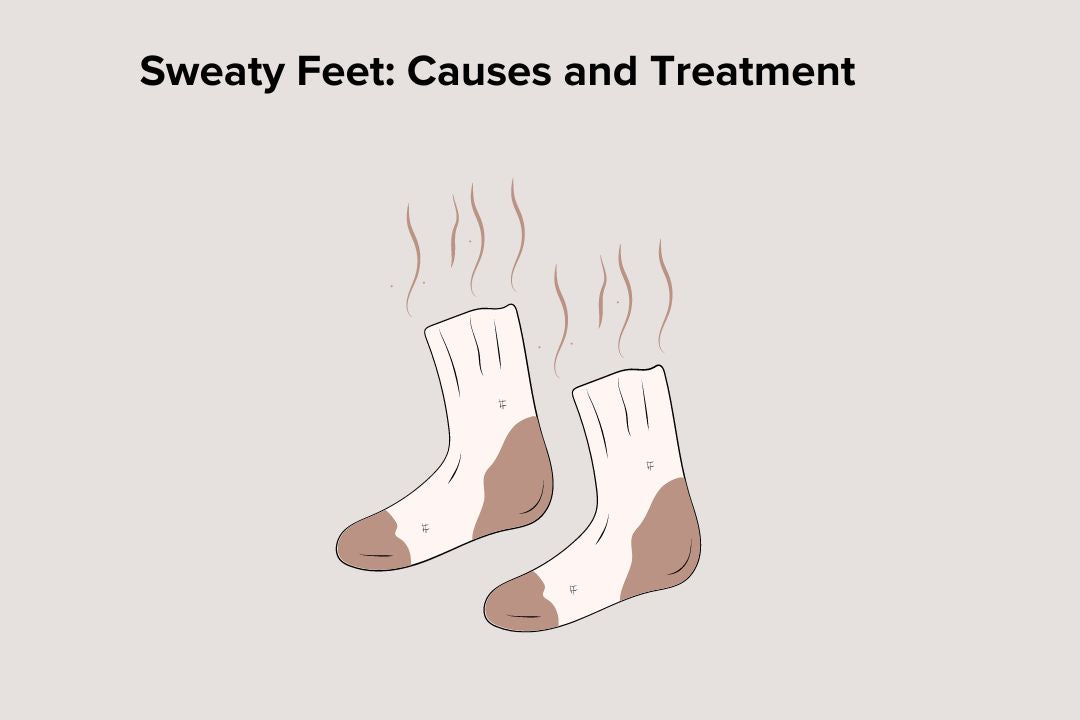
Sweaty Feet: Causes and Treatment
Sweaty feet, medically known as plantar hyperhidrosis, can be a real challenge for many. Some people experience minor foot sweat, but it can be so severe that it causes discomfort and even embarrassment for others. Sweaty feet aren't just about feeling moist after a workout—they can be a constant problem, even in cooler temperatures.
Many factors can influence how much your feet sweat, from the types of socks you wear to your lifestyle choices. Let's explore why your feet might sweat so much and how choosing the best socks for sweaty feet can help.
Understanding Sweating
Sweating is a natural bodily function that helps regulate temperature and keep our bodies cool. However, the sweating can sometimes seem excessive when it comes to feet. The skin on your feet has more sweat glands than any other part of your body, which are particularly active. So, what’s behind the sweat?
Normal vs. Excessive Foot Sweat (Hyperhidrosis)
Normal sweating occurs when your body temperature rises due to heat, physical activity, or stress. It’s your body's way of cooling down. However, excessive sweating, especially when it’s not hot or you’re not physically active, may indicate a condition known as hyperhidrosis.Hyperhidrosis is when your sweat glands go into overdrive, producing far more sweat than your body needs for temperature regulation. While sweating is a natural process, excessive sweating can lead to issues like foot odor, infections, and a constant feeling of dampness.
Common Sweaty Feet Causes and Triggers
Foot sweat varies from person to person due to several factors. Some naturally have more active sweat glands, while others may sweat more due to underlying health conditions, stress, or specific environmental factors. It's important to understand these causes to address the problem effectively.
High Temperatures and Humidity
Warm weather may increase sweating as your body attempts to cool itself. Humid conditions make it harder for sweat to evaporate, worsening the problem. Research on exercise-induced sweating highlights the challenge of cooling through sweat in humid environments.
Stress and Anxiety
Stress and anxiety may activate sweat glands, increasing sweating, particularly in the hands and feet. Research has shown that hyperhidrosis (excessive sweating) is a common symptom in individuals with social anxiety disorder, leading to heightened stress during social situations—study on hyperhidrosis and anxiety.
Hormonal Changes
Hormonal shifts, such as during puberty, pregnancy, or menopause, may also increase sweat production. A study highlights how hormonal fluctuations, particularly during menopause and hyperthyroidism, are common causes of excessive sweating.
Physical Activity
Physical activity may raise body temperature, causing sweat as part of the body's natural cooling process. A study found that trained individuals may have a significantly higher sweat rate than sedentary people, suggesting that physical training may enhance the sweat glands' secretory activity. Additionally, gender differences were observed, with men potentially producing more sweat per gland while women may have a higher sweat gland density.
Health Conditions Associated with Sweaty Feet
Certain health conditions can directly contribute to excessive foot sweating:
- Hyperhidrosis: As mentioned earlier, hyperhidrosis is characterized by excessive sweating. It can affect various body parts, including the feet, and often requires medical treatment to manage effectively. People with hyperhidrosis sweat more than necessary. This is usually why your feet sweat so much, even when you're doing nothing, as the condition causes sweat glands to be overactive without the usual triggers like heat or physical activity..
To manage hyperhidrosis effectively, treatment is typically based on the Hyperhidrosis Disease Severity Scale (HDSS), which helps tailor therapies according to disease severity and location. For mild cases, topical aluminum chloride is often the first-line treatment, as discussed in our section on treatment options for hyperhidrosis, which also covers advanced therapies like botulinum toxin injections and iontophoresis for more severe conditions. - Fungal Infections like Athlete’s Foot: Sweaty feet create the perfect environment for fungal infections to thrive. Conditions like athlete’s foot are more common among those who sweat heavily, as the moisture provides an ideal breeding ground for fungi. This can lead to itching, burning, and peeling skin, making foot care even more critical. Dermatophytic infections, like Tinea pedis (athlete’s foot), are caused by fungi such as Trichophyton rubrum, which thrive in moist environments. Recent trends show a rise in the prevalence of chronic dermatophytoses, which are becoming harder to treat due to increasing resistance to antifungal therapies. Properly managing these infections, especially in humid climates, is essential to prevent recurrence.
- Diabetes and Foot Sweating: Increased foot sweating, often linked to sweating in diabetes, is a complication many individuals with diabetes experience. Just as the body’s sweating mechanism is triggered by adrenaline release and environmental factors, in people with diabetes, issues like autonomic neuropathy can cause excessive sweating, particularly in the feet, or a complete lack of it. This imbalance in sweating can make managing foot care essential, requiring regular check-ups to prevent skin complications.
- Emotional and Psychological Impact: Having sweaty feet can affect your mental health. The constant worry about foot odor, the discomfort of wet feet, and the potential embarrassment in social situations can lead to anxiety and lower self-esteem. Managing foot sweat isn’t just about physical comfort—it’s also about emotional well-being. Research, such as this review on the impact of hyperhidrosis, shows that excessive sweating can lead to anxiety, depression, and social isolation, highlighting the importance of addressing foot sweat for both physical and emotional health.
Why Are My Palms and Feet Sweaty All of a Sudden?
Sudden sweating of the palms and feet, also known as sweaty hands and feet or secondary hyperhidrosis, can be triggered by various factors. Unlike regular sweating that happens due to heat or physical activity, this condition can be linked to an underlying issue such as anxiety, hormonal changes, or even a response to medications. Sudden sweating may also be triggered by stress or panic, where your body activates sweat glands in response to heightened emotions.
If you experience sudden sweating without any apparent reason, it's advisable to monitor potential lifestyle changes, stress levels, or new medications that might influence this reaction. In some cases, sudden excessive sweating might signal a need for medical evaluation to rule out other health conditions, such as hyperthyroidism or an infection.
How to Prevent Sweaty Feet: Tips and Tricks
Confident lifestyle choices can exacerbate foot sweat. Fortunately, minor adjustments can make a significant difference.
- Footwear Choices: Wearing shoes made from non-breathable materials, such as synthetic fabrics, can trap heat and moisture, causing your feet to sweat more. Opt for breathable shoes made from natural leather or mesh, allowing better airflow and reducing sweat buildup.
For the best slippers for sweaty feet, choose moisture-wicking fabrics like bamboo or cotton, which helps your feet stay dry while providing comfort. Opt for the best shoes for sweaty feet made from breathable materials like natural leather or mesh, which allow better airflow and reduce sweat buildup. - Choosing the Right Socks: The types of socks you wear are crucial. When managing sweaty feet, not all socks are created equal. The key is to choose socks made from moisture-wicking materials that help keep your feet dry and comfortable. These socks draw moisture from your skin, reducing sweat build-up and preventing odor. It’s best to avoid synthetic fibers like polyester or nylon, as they can trap moisture and worsen sweating. Instead, look for natural options like organic cotton, Merino wool, or bamboo, which are breathable and naturally help wick away sweat. For more tips, check out our article on the best socks for sweaty feet.
- Daily Foot Care Routine: Maintaining proper foot hygiene is crucial. Wash your feet daily with mild soap and water, and dry them thoroughly, especially between the toes. This routine helps prevent bacteria and fungi from thriving in the moist environment. Using footpowder can also help absorb moisture and keep feet dry throughout the day.
- Diet Choices: Foods high in caffeine or spicy ingredients can stimulate your sweat glands. Cutting back on coffee, energy drinks, and spicy dishes may help if you're prone to sweaty feet.
How to Stop Sweaty Feet: Treatment Solutions
Managing sweaty feet can be as simple as incorporating the right products into your daily routine. Here are two practical solutions:
- Foot Spray for Sweaty Feet: A foot spray explicitly designed for sweaty feet can help keep them dry and fresh throughout the day. These sprays often contain antiperspirant ingredients, such as aluminum chloride, which block sweat glands, reduce moisture, and prevent odor. Some sprays also include essential oils that add a refreshing scent while helping to control sweat. If you have persistent or severe sweating that doesn’t respond to over-the-counter sprays, it may be time to see a doctor for further treatment options.
- Powder for Sweaty Feet: Foot powders are another practical option for managing sweaty feet. Powders absorb excess moisture and reduce friction, which helps prevent blisters and odor. Look for powders containing cornstarch or talc for essential moisture control. If you're prone to fungal infections, opt for powders with antifungal ingredients like miconazole or tolnaftate to keep your feet dry and healthy.
- Advanced Treatment: In severe cases, seeking medical advice may be necessary for long-term solutions to sweaty feet treatment.
Final Thoughts
Sweaty feet can be more than just a nuisance; they can lead to discomfort, odor, and health issues. Understanding the sweaty feet causes and taking proactive steps to manage them is essential for maintaining foot health. From choosing the right socks and shoes to adopting a daily foot care routine, there are effective ways to keep your feet dry and comfortable. If sweating persists or causes significant discomfort, consider consulting a healthcare professional for further advice.
Can sweaty feet cause blisters?
Yes, sweaty feet can cause blisters. Excess moisture makes the skin soft and more prone to friction, leading to blisters, especially if you wear ill-fitting shoes or non-breathable socks.
Are sweaty feet a sign of pregnancy?
Yes, sweaty feet can sometimes be a sign of pregnancy. Hormonal changes and increased blood flow during pregnancy can raise body temperature, causing the sweat glands to become more active, including those in the feet.
Why do my feet sweat without socks?
Your feet may sweat without socks because there’s nothing to absorb the moisture. Shoes made from non-breathable materials can trap heat and moisture, causing your feet to sweat more.
Why do my feet sweat even when it is cold?
Feet can sweat in cold weather due to overactive sweat glands, known as hyperhidrosis. Stress, anxiety, or wearing shoes that trap heat and moisture can also cause feet to sweat regardless of the external temperature. Your body might be trying to regulate temperature or reacting to stress, resulting in sweaty feet even in colder conditions.
Do black socks make your feet sweat more?
No, the socks' color doesn’t cause your feet to sweat more. However, black socks made from non-breathable synthetic materials like polyester or nylon can trap heat and moisture, increasing sweating. Choosing breathable, moisture-wicking materials like organic cotton or Merino wool is essential to keep your feet dry, regardless of the color.
Why are my feet the only thing sweating?
Feet can sweat more than other body parts because they have more sweat glands, especially when confined in shoes or socks, which can trap moisture and heat.
What deficiency causes sweaty feet?
A magnesium deficiency can sometimes cause excessive sweating, including sweaty feet, as it helps regulate body temperature and manage sweat production.




